QuestionQUESTION: I have owned "HORSES" in the past but I recently got this two year old colt stud given to me to rescue and I had him leading and staying still for his baths and such and with in the past month he as gotten very aggressive toward me and my husband, We was working with him today and put him back in the field and he ran right through our electric fence. (he has never done that before),He is biting , rearing and bucking . So I was wondering if I get him gelded will he calm down a little? I have never owned a colt before so could you please help me out? I dont wanna get rid of him I feel he has potential.
ANSWER: Gelding him would help tremendously, as would take away some of what you are seeing.
The main problem with him may be in the way you and your husband are dealing with him.
I don't know how much experience you have, so if some of this is redundant, just move on to what you can use. Also what breed is this horse, or do you know?
I also don't know what, if anything you are feeding, so please let me know that also.
If you are feeding this horse, in a pan, or stall setting, or even just tossing hay out for him, do not give ground. Make him wait to approach it. You may need to carry a lash whip with you, or even a long branch or stick, just something to keep him from getting into your space. Horses will interpet you backing away from the feed as you are beneath them in the herd, and that you are scared of them.
A good method to establish space is to have a long limb still with smaller limbs and leaves on it, something that will rattle when shaken. Keep it low, and make the colt back up, do not make him run, unless he wants to act the fool, but move him around the pasture, and don't let him go where he decides to, just where you decide to. Only one of you need to work him at a time like this, and when he gets a different look to him, calmer, more interested in what you are doing, than what he wants to do. You will recognize it, I am not talking about the lip licking thing. It is just they are not sulled up and belligerent to you.
Use your branch to back him off of feed,and to move him around, and you decide when he can approach the feed. Do not do this in a contest of wills, just be firm and very low key. Do not jabber, or talk a lot. Be still, and make your words short, a simple back, or a low growl works best. Too much talking to a horse many times makes them think you are flapping your lips like a baby does, to show that you are inferior, and beneath them.
The feed if any, that you are feeding could be too hot, in that has too much corn, or too much molasses. I have even seen problems for some people who fed nothing but oats. It made their horses jumpy, full of pep, and in general an aggravation to be around, and a danger. Alfalfa hay is too hot a hay if the horse is not in heavy training in most cases. Saw one QH that just a couple of bites of peanut hay would have them tap dancing in the rafters.
I asked about the breed because Thoroughbreds don't do electic fences well, nor do some other hot breeds, and will run right through them. You also, if you don't already, need to put the surveyors pink or orange tape every couple of feet, to let horse know where fence is.
And make sure, when you go to return him to pasture/paddock, that you walk him all the way in, and here I like to get at least 15 feet inside the pasture, turn so that your back is to the gate, and horse is facing it. Make a V of your left hand and as you pull on the headstall strap, V your hand up under it, and pull the end of the strap off of tongue of buckle. As you drop halter, step backwards and keep moving backwards. This way, if as most horses do, he kicks up and out, his hind feet will be away from you, and he will have to wheel to kick in your direction. The V of the hand, is because with that hand shape, fingers V'ed out from thumb, you do not run as much of a risk of getting a finger caught in a halter ring.
Also, just an aside here. At any time when you are picking up feet, on the hind feet, never grasp the leg with thumb V'ed away from fingers, always cup entire hand around back of leg. On the front you can separate them, as there a horse will pull away from you, but on the hind feet, their power is in the backwards kick, and if you have thumb on one side, and fingers on the other, will break your thumb, at the worst, and give you a dislocated one or major bruises at best. Just thought would toss that one in there.
On the biting, you need to stop this now. I have know of stallions who have ripped out jugular veins, or torn off arms of trainers. This is serious and would not be fun to have to have your face replaced.
If he is biting when you are grooming, do not look at him, merely bend your arm like you were going to do the Chicken Dance, and let him run himself into your elbow point. Do not look at him, or acknowledge that anything has happened. Don't say anything either. Continue with what you were doing. Let him correct himself. If he is nipping when you are holding lead rope, or your hands are near his face, then take a horseshoe nail, and let the very tip, and I mean just the tip, like would be enough to run a pair of pantyhose, stick out between your knuckles. Like we are taught as women to carry keys in a parking lot, only not so far out. Let him bump into your hand/nail. Again no talking, no laughing, no nothing. Let him correct himself. He will begin to feel that there is a zone around you that protects you, and he can't cross. It will not break his spirit, nor wound him, just teaches him there are things about you that bear watching.
Horses want a leader, it is their nature. If you are not stepping up to the plate then he will be the leader, and you will be in major trouble.
If you are not using a chain shank to lead him, get one. Put it through the near side halter ring, twist at least once around nose band, and hook to off side, or underneath to ring under chin. Give him a pop once or twice, so that he knows to behave himself, but don't keep popping it if he settles down.
On any of this that I am recommending, the key is to do just enough to get the behavior you want from him, no more. The slightest amount only.
Do be careful about the rearing, as he could drop his forelegs on your shoulders and take you down, as that is how they mount mares. The chain shank should help with that. When he goes up, catch him before he does it. A horse will get "light" in the front end, because they have to shift their weight to their hindquarters. That will tell you what he is going to do before he does it, giving you a chance to stop it first. When you see he is going to think about going up, lightly pop the shank and tell him to get his feet on the ground, or a phrase you like. Just short and the same one, even be still works.
Also do not lead this horse anywhere by letting him trail behind you, always stay at his throatlatch, and keep your lead rope about a foot in length, and if he starts to swing his head over to nip, make a fist with your thumbnail out and let him run into that. That teaches him to keep his head off of you.
And don't give him mixed messages, don't play with his mouth, giving him treats, or rubbing his lips, or giving him kisses. And don't let him get away with something one time, that the next time you don't want him to do. It is not fair to the horse.
Horses will almost always give a clue as to what they are planning to do. A shift in weight, ears going back and forth, not together but one at a time means they are thinking about doing something. A "closed" feeling to their mind, only way I can describe it, they just get blank, like a wall, lets me know they are fixing to do something I probably won't like.
Again the gelding is the main thing, and check the feed type too, and watch how you are handling him. Do not trust him, and keep everyone else clear of him until you get this under control.
I would also begin looking for a good trainer, as this is more than likely going to be the best way to work with him, and give you a horse you can enjoy.
Remember, it costs just a much to feed a horse that you can not enjoy, as it does one you can. A horse like this, unless you get on top of what you are describing will eventually end up in a kill pen, because there are too many good horses out there cheap.
Be careful, and some books I always recommend, because they are sensible, are by Mark Rashid, starting with Considering the Horse, and Lessons from a Ranch Horse, along with about three others. He has gotten into martial arts, in at least two of his last books, and gets off track into that, but the first 4 or so are excellent.
---------- FOLLOW-UP ----------
QUESTION: Hello Melanie. I am going to try everything you have told me. He was doing so good until this past month. But he is pretty aggressive when it comes to his food so I am going to have to definately try the food tricks. He is a wonderful horse and I do not want to get rid of him. I want to try everything I can to get him trained. He is my sons pride and joy. I think I am going to have my husband try the things you mentioned just for the fact that he is stronger than me and our colt is pretty large. Also he is a Paint/quarter. He is walking around with his "PRIVATES" hanging all out so that has me thinking that is the problem. I am going to see about getting those books.I have alot of experience with Adult horses but I have never owned a colt. I am hoping this all works out he is such a great horse
ANSWER: You also have to figure, as I don't know where you live so if in SE may not matter much yet, that the weather is cooling off some too.
You didn't say how long you have had him, I don't think, and what shape he was in when you got him. It could be if he was starved down, that he is just now coming into himself, and too, the weather will cause them to act up.
But geld him. Best thing for all concerned.
And the food aggression, nipping that in the bud, will help a whole lot, as in his mind, when you give way for him to come to food, you are beneath him, and he is your boss.
I know you said in other part what you are feeding him, but I am not familiar with that feed, but check the protein content. And maybe, if not pellets,switch to a 10% pellet. Might help.
But remember who bought who, or who writes the check for the feed, and be his boss.
(And can't remember if put this on the long post about the horse of LaTona whose name is Red, but I never once hit him with the branch, not one time, I just shook it at him. The whole thing is, it was something unexpected, unknown, and gave me an edge over him.)
---------- FOLLOW-UP ----------
QUESTION: No he isnt registered but his mom and dad is. I have had him for about 3 months now. He was very thin when I got him.You could see his ribs and hips very bad. Now you cant see his ribs but his hips are still a little thin. We live in SE ohio and he has a 15 acre pasture. Ever since we put him in the large pasture (we had him in a 2 acre pasture at first because of the alfalfa) he has gotten rowdy. I am fairly attached to him but my kids are way more important. if he is not going to change i may get rid of him. when he bit my husband and tried to bite me he bit onto our shirts by our belly. I have never dealt with a horse like this before . He has always listened to my husband until this past few weeks. my husband had him backing up and leading very well.he will still lead with my husband but if Bandit didnt want to go he would bite at him. when we first got him he never had human contact what so ever. We walked him on a 3 hour trail (leading) and he did very well. But the blank look you was talking about I have seen that the past few times I have went down to see him. It is kind of evil looking. I trust your opinion for owning horses and so forth so what is your honest recommendations? should I get rid of him or stick with him? I am personally scared of him right now and he has tried to mount me and i push him to the side and stepped away so he didnt come down on my head. I am kind of scared he will hurt someone how he acted yesterday. He has never acted like that before........... Thank you so much for all the feedback
AnswerThe two acre pasture had alfalfa, or the one he is in now? What kind of grass is he on if not alfalfa? Call your USDA extension office and ask if there is any type of pasture combined with whatever weather you are having that could be revving this horse up.
The forage could be causing all of this, may not be, but darn sure could be, that is why I had asked about feed. And ask the agent to come out and look over your pasture, and see if they can take samples to see if there is anything in there that could be causing some of this. Could be a weed, could be the whole pasture. But they can generally give you some ideas. The agent may also be able to test the grass for you too. And generally will do it free. And they may know of problems in that pasture already.
Call them, they are usually in the courthouse, and are under USDA. 4H is run through them. And go online to your states website, and search for Toxic plants, and see what comes up.
Also, I imagine Ohio has a vet school? Go online and find them, and see if there is a question section, and ask about various grasses and conditions in Ohio that might be causing some of this.
If not, go to Auburn University site in Alabama, and ask questions there.
Some grasses or weeds only cause problems when the weather conditions are right or one way, rain + really hot, or dry and hot, etc.
It is worth looking into, as you said this has started since you got him into the bigger area, or at least has gotten much worse.
Grasses go through differing stages of nutrient value as it ages, and prepares to die down in the fall, but start asking about that.
And ask old timers if there is anything funny about the pasture that they know of if they are horsemen, or stockmen. But cows can take some stuff that horses can't in terms of feed, so find a horse person if you can.
And is this pasture near your house? If not, or even if is, could someone be bothering him, like shooting him with BB's or tormenting him with four wheelers or chasing him or being mean?
And what breed is he, and how is he bred, what lines?
But geld him still.
These are something different to consider. May not change anything, but could put him back in smaller area and see if in a week or so he is different.
It could be worth a try.
If after looking into these new considerations, he still is the same as he has been lately, I would get rid of him, if I could not find a trainer to work with him, after gelding him.
Gelding will cost around, depending on area, a couple of hundred, could be less, just depends on vet.
Without seeing the horse, and how you are interacting with him, I am just going on what you have written of course, but it does not sound to me like either you or your husband have the experience to deal with the type of things this horse is doing. This is something that really needs someone who can get this colt's attention, and make him behave.
As it is now, the problem is only going to get worse. And it just isn't worth it. I have seen and have known of horses that were like this horse at this horses age. WC Will Shriver, a Saddlebred stallion was one like him, so much so that the trainers begged the owner to geld him. Never could trust him, and he took several grooms down, but he was worth in the 70's hundreds of thousands of dollars, and I seem to remember he was insured at one point for a couple of million. A big difference to your case.
In someone else's hands, who work daily with horses, and are used to dealing with attitude, this colt could be fine, and be enjoyable. But there is always a possiblity that there is a screw loose somewhere too.
You have several options, if you choose to keep him, and deal with this, and in all of them, I still recommend gelding immediately.
1. Geld him, leave him alone over the winter, except to feed, etc, and see what spring brings.
2. Geld him, and send him to a trainer, one that you have seen horses trained by. Don't just send him to someone who may make this problem worse, plus add others.
3. Geld him, and get some lessons from someone who will come to your place and work with you and him and husband.
Other options, are to let someone else have this headache, and find a horse that is enjoyable and safe.
But whatever you do, if you keep him, quit babying him, and while I rarely advocate this, the next time he tries to bite you, nail him in the muzzle with a fist.
There is one old remedy, but you have to be able and willing to take the extra steps for it.
And you need to know where he is going to grab you, a shoulder or arm is the best place.
Take a baking potato, a long one, you used to have to boil them, but can microwave them now, and take a wet sponge, tape it to arm and then set potato on it, and secure it, and then cover with light shirt. Turn so horse strikes it with his teeth. Horse has corrected himself, you don't make any notice of it. But this can only be done, if you know where this horse is going to strike.

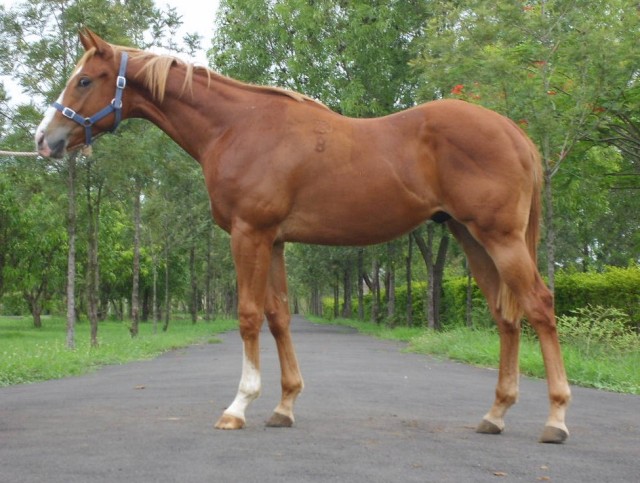 deep ribcage
Question
deep ribcage
hello maam, does this hors
deep ribcage
Question
deep ribcage
hello maam, does this hors
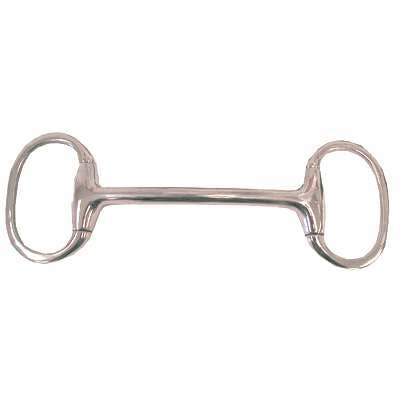 straight bar V single joint bit
Question
mullen mouth
hello maam, do straight ba
straight bar V single joint bit
Question
mullen mouth
hello maam, do straight ba
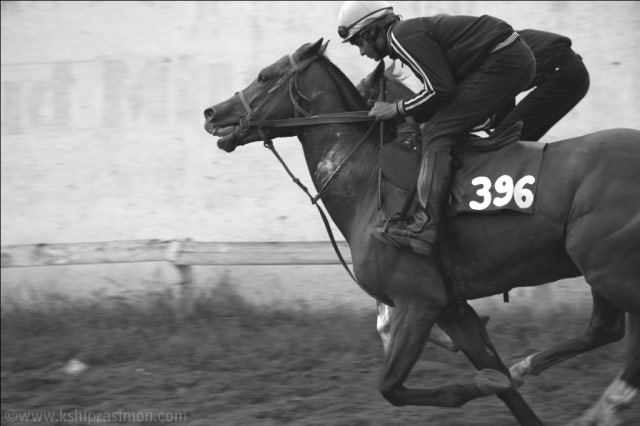 tongue up
Questiontongue up
QUESTION: hello maam, is this
tongue up
Questiontongue up
QUESTION: hello maam, is this
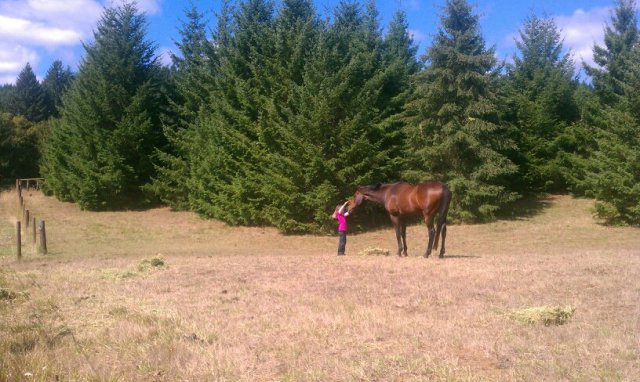 welsh 2yr old
QuestionHi there, was just reading a post about a lady
welsh 2yr old
QuestionHi there, was just reading a post about a lady
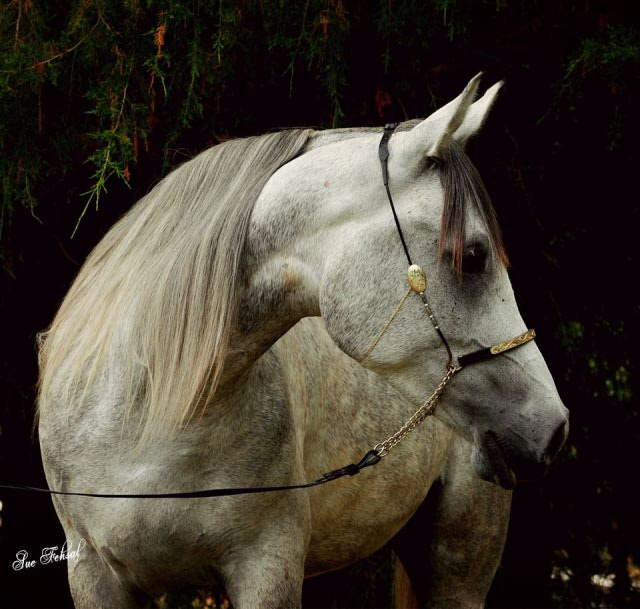 My Arabian
Question
Kadin
Hi, I have a 4 year old Arabian t
My Arabian
Question
Kadin
Hi, I have a 4 year old Arabian t